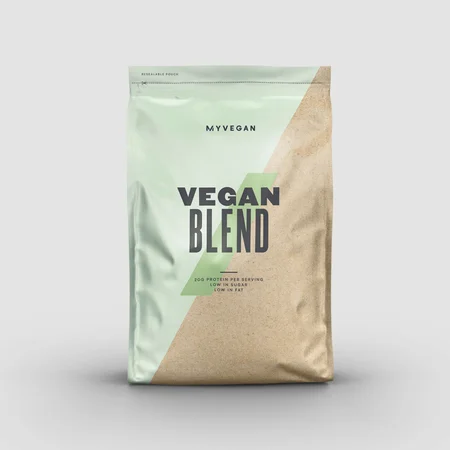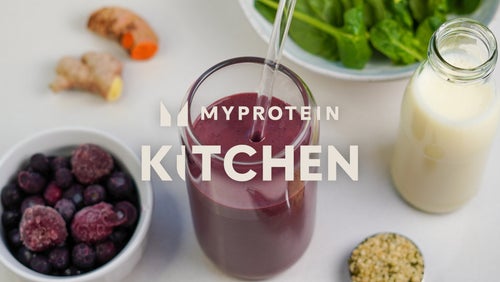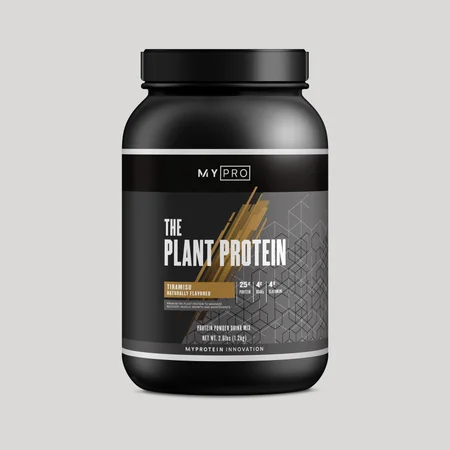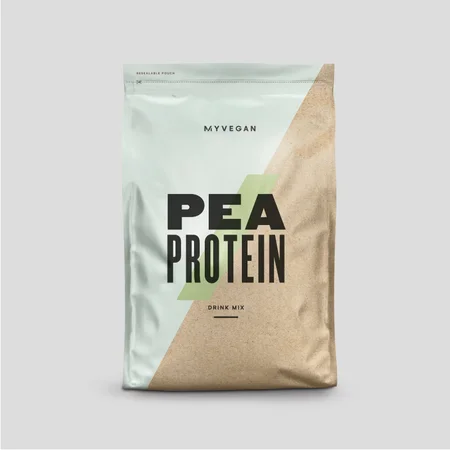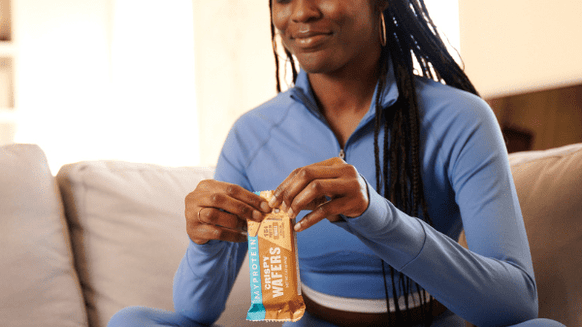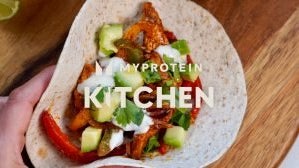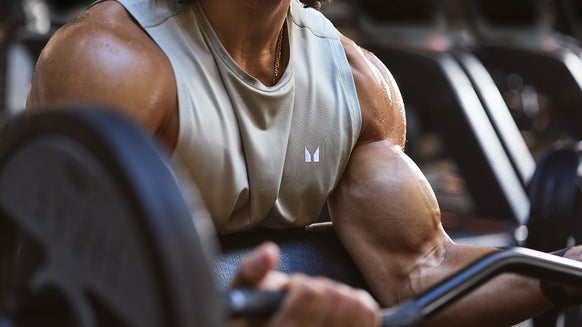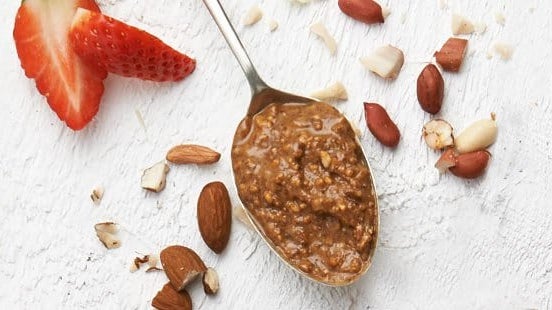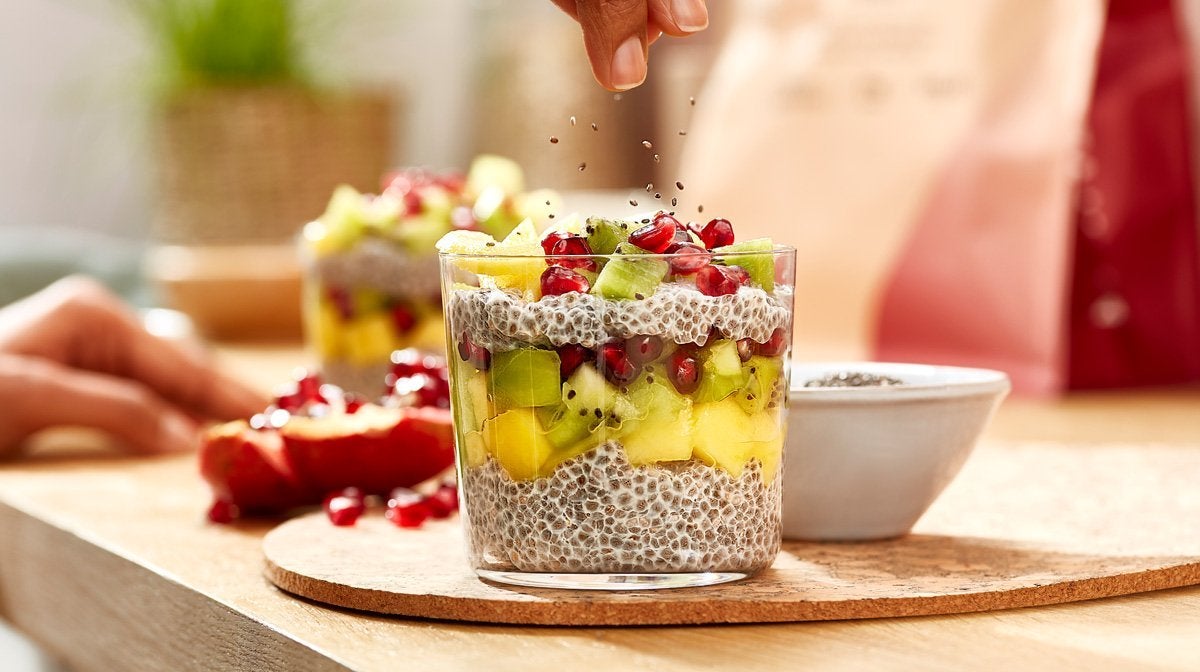
You may have heard the phrase that breakfast is the most important meal of the day, and while context is super important when it comes to nutrition and no meal is necessarily more important than the other, breakfast is associated with many benefits, with high-protein breakfasts specifically boasting even more benefits.
In this article, we will explore the importance of high-protein breakfasts and provide lots of inspiration to help you to up your breakfast game.
- Importance of High-Protein Breakfast
- Benefits of High-Protein Foods in the Morning
- High-Protein Breakfast Foods
- Nutritional Requirements for a High-Protein Breakfast
- Classic High-Protein Breakfast Recipes
- Innovative High-Protein Breakfast Ideas
- Meal Prep High-Protein Breakfast Recipes
- Freezer-Friendly Breakfast Recipes
- On-the-Go High-Protein Breakfast Recipes
- Portable Breakfast Solutions
- Tips for Incorporating High-Protein Foods into Breakfast
- Practical Tips for Daily Protein Intake
- Personalizing High-Protein Breakfasts to Fit Dietary Needs
Importance of High-Protein Breakfast
The body is in a constant state of muscle breakdown and repair, which is why it’s important to consume protein at regular intervals throughout the day, regardless of your fitness goal.
When you go long periods without consuming protein (eg overnight), the rate of protein breakdown may exceed the rate of protein synthesis, meaning you may experience very slight muscle loss. Consuming at least 20-30g of protein at breakfast can promote muscle protein synthesis and help prevent this negative protein balance.1

Whey Protein Timing | The Best Time To Take Protein Shakes
We reckon any time is a good time, but here's what the experts say....
Benefits of High-Protein Foods in the Morning
Many people find it hard to hit their protein requirements, which also tend to be higher in those who are active. A high-protein breakfast provides an opportunity to get in a quality source of protein to contribute towards your target, and support muscle maintenance and growth (and many other important bodily processes too!).
Incorporating high-protein foods at breakfast has been shown to have other benefits too, such as…
Protein is an important nutrient when it comes to satiety, meaning it can keep you feeling full and satisfied after a meal.2
Protein has also been shown to have an impact on appetite-regulating hormones, with a higher protein intake increasing the levels of hormones GLP-1 and peptide YY, which are considered appetite-reducing, while also reducing the levels of ghrelin, a hormone that signals that we are hungry.3,4
Research has shown that a high-protein breakfast can lead to lower blood sugar than a low-protein breakfast.5 Avoiding spikes and drops in blood sugar can help to keep energy levels stable throughout the day, but also reduce cravings and support appetite control.6
Because a high-protein breakfast can keep you fuller for longer and regulate appetite, it can help with overeating in the evening.
A study found that the high-protein breakfast reduced late night snacking on high-fat and high-sugar foods when compared to a low protein breakfast.7
High-Protein Breakfast Foods
A food is considered high in protein when at least 20% of the energy value of that food is provided by protein.8
Incorporating a variety of these foods not only helps you to meet your overall protein requirements but also ensures that a range of amino acids are provided.
Protein is made up of amino acids, which are like the building blocks of protein. Different proteins contain different combinations of amino acids. There are 20 amino acids that are needed for bodily functions, but nine of these are considered “essential”. Essential amino acids are the amino acids that we cannot make within our body and so they must be obtained from food.
In general, animal sources of protein are considered “complete” as they contain all nine essential amino acids. Whereas plant-based sources of protein are typically missing an essential amino acid or have lower levels of amino acids.
Including a range of high-protein foods, especially if you are plant based, can help to ensure you are getting a combination of amino acids in the doses they are needed.

Essential Amino Acids | Everything You Need To Know
Find out more about this “essential” ingredient that makes protein so powerful....
Nutritional Requirements for a High-Protein Breakfast
Protein is considered a macronutrient, meaning that we need it in large amounts (“macro”), as are carbohydrates and fats. Focusing solely on protein at breakfast and neglecting carbohydrates and fats, as well as vitamins and minerals that provide micronutrients, can have negative impacts on both health and performance.
A study found that endurance athletes who prioritized protein over carbohydrates took longer to complete a time trail than those who followed a moderate protein and carbohydrate diet.9 So, protein is super important, but don’t neglect other nutrients!

Macro Calculator | How to Calculate Your Macros for Flexible Dieting and IIFYM
Use our calculator to work out your macros....
To build a balanced breakfast, ensure you include a source of starchy or fibrous carbohydrates like wholegrain bread, oats, or cereals with your protein, as well as some healthy fats to support your hormones and heart health. Adding some color through fruits and vegetables can provide essential vitamins and minerals that our body needs, as well as a source of fiber, which is important for a healthy digestive system.
Classic High-Protein Breakfast Recipes
These classic high-protein breakfast recipes are simple and effective, and are already balanced, making great breakfast options to set you up for the day.
Eggs are a powerhouse of nutrition, providing vitamins B and D, as well as protein. Providing around 6g of protein per egg, you can bump up the protein in a standard two-egg omelette by adding extra egg whites or serving alongside salmon or halloumi.
Adding a scoop of protein powder to your usual pancake batter is a super simple way to increase the protein content of a relatively low-protein breakfast. Or you can try Protein Pancake Mix — all you need to do is add water.
If you like your pancakes how they are, you could boost the protein intake with what you pair them with, such as topping with Greek yogurt or going the savory route with eggs and turkey bacon.
Oats are naturally high in fiber, and pairing them with Greek yogurt and protein powder is a brilliantly balanced breakfast. Overnight oats can be prepped in advance and are a fun way to enjoy a high-protein breakfast.
If you’re vegan, dairy-free yogurts typically aren’t as high in protein as Greek yogurt. Soy yogurt tends to be higher in protein than other options, like coconut yogurt. A good idea is to add a scoop of Vegan Protein Blend to your usual dairy-free yogurt.
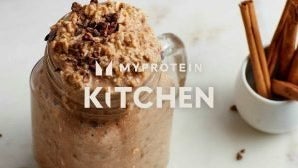
Super Overnight Oats Recipe
a top-tier breakfast to set you up for the day....
Innovative High-Protein Breakfast Ideas
If you’re tired of your routine breakfast rotations, these recipes might help to keep things interesting while still providing a nourishing hit of morning protein.
Quinoa (pronounced keen-wah) is a grain that’s naturally high in protein. When cooked like oatmeal, quinoa makes a super-creamy breakfast. Once cooked, stir through protein powder and some frozen berries for a delicious meal to start the day.
Chia seeds are a great source of fiber and are also packed with omega-3 fatty acids.
Omega-3 fatty acids have been shown to reduce the incidence and severity of delayed onset muscle soreness (AKA DOMS) after exercise, making them a great addition to any active individual's breakfast.9,10
Adding yogurt or protein powder to make a chia seed pudding makes it a great high-protein and well-rounded breakfast.
Topping a high-protein smoothie bowl with some carbohydrates like muesli and fats like nuts creates a balanced breakfast that’s sure to satisfy you throughout the morning.
Incorporating milk or yogurt in a smoothie can bump up the protein or you could add a protein powder, or both. Check out these smoothie bowls for ideas:
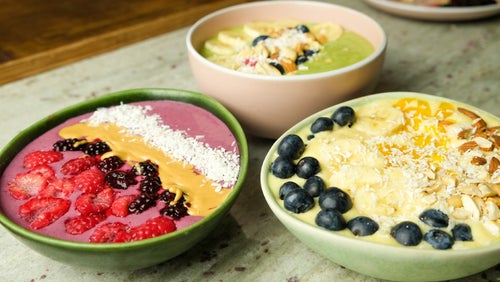
Vitamin-Boosting Smoothie Bowls 3 Ways | High-Protein Breakfast
What better way to start your day than with a boost of essential vitamins? ...
Meal Prep High-Protein Breakfast Recipes
The mornings can be a rush, and breakfast can often take a hit. Typical on-the-go breakfast options are usually not very balanced or high in protein. This is where recipes that you can make in batches or in advance the night before can be so helpful for ensuring breakfast isn’t sacrificed, nor its quality.
Similarly to overnight oats, the flavor combinations of overnight wheat biscuits are endless, making them a super-versatile breakfast that you can have on rotation. They’re easy to prepare, can be made in advance, and are ready to grab and go when you’re running out the door.
You can make this salted caramel recipe using Impact Whey Protein.
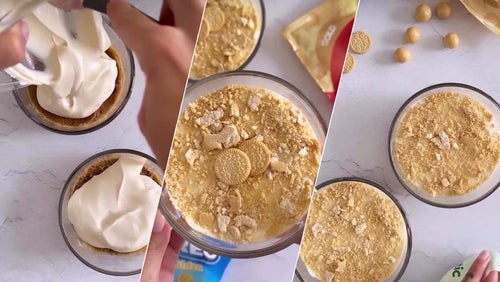
Gold Overnight Protein Wheat Bisks
This indulgent, high-protein breakfast is worth getting out of bed for. ...
A breakfast smoothie is an all-in-one meal providing protein and fruit. You could have it in a glass before you leave the house or in a shaker as you’re running out the door.
For the savory breakfast lovers, breakfast burritos are a great option. You can make them in advance and roll them up to have at the office or on the go. They can also be easily adapted to be suitable for vegetarians, and adding things like beans and guacamole can increase the fiber content, which will keep you fuller for longer and keep your gut happy.
Freezer-Friendly Breakfast Recipes
Prepping some breakfast meals in advance that you can freeze when you’re stuck can be a great back-up breakfast.
You might not have thought you could freeze pancakes, and if so, this might be one of your greatest revelations.
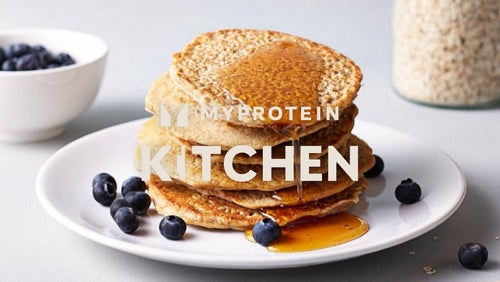
4-Ingredient Foolproof Banana Protein Pancakes
Make the perfect pancakes, even if you're a rookie....
Make your own breakfast sausage patties with lean beef or turkey mince and freeze them alone or as part of a homemade muffin that you can freeze and heat up in the oven or air fryer.
Baked oats are always trending, and it’s easy to see why.
Completely delicious, minimal ingredients and prep. And completely freezable.

Chocolate Chip Pumpkin Baked Oats
Finish off pumpkin season strong with these Chocolate Chip Pumpkin Baked Oats....
On-the-Go High-Protein Breakfast Recipes
For a lot of people, getting up even earlier than they already are to prioritize breakfast could be the barrier that’s stopping them from choosing a high-protein and balanced breakfast, or even a breakfast at all! These on-the-go options are a great choice if you’re not wanting to add any more tasks to your morning routine.
You can pop some Greek yogurt into a plastic container the night before and take some toppings like nuts, granola, berry compote, or fresh fruit with you to throw it all together when you’re ready to eat.
Having some eggs prepped can be handy to grab to take to work to have with fresh toast, to top salads, or to have as a snack with some veggies. Or, you can just have them just as they are.
Portable Breakfast Solutions
When breakfast at home isn’t an option, these recipes make great on the-go breakfasts.
Wraps can be literally wrapped up in tinfoil and can be eaten on the go or when you’re able to sit down and have them. And the combination of high-protein fillings is nearly endless.
Smoothies are the perfect portable breakfast — simply pop them in a shaker, a flask, or even a mason jar.
These protein muffins are super easy to transport and take with you when you’re having breakfast on the go. As the name suggests, they’re high in protein as well as providing a balance of carbohydrates and fats.
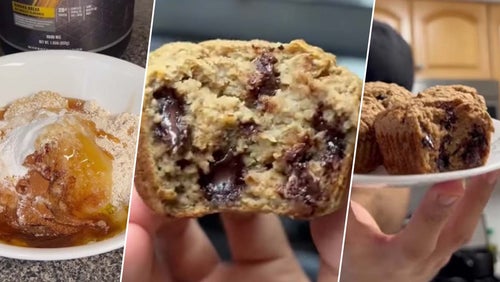
Healthy Banana Bread Protein Muffins
Super-soft and fluffy every single time....
Tips for Incorporating High-Protein Foods into Breakfast
Protein is super important at any meal, but a combination of protein with wholegrain carbohydrates, healthy fats, and some fruits or vegetables is the perfect combination for a balanced breakfast.
Practical Tips for Daily Protein Intake
Protein is a nutrient that the body cannot store, which is why it’s important that we eat it consistently throughout the day.12 The body is in a constant state of muscle protein breakdown and repair, so having protein throughout the day to ensure that this process is supported helps to support maintenance and growth.
Personalizing High-Protein Breakfasts to Fit Dietary Needs
Everyone’s nutrition requirements will vary, particularly when it comes to protein. If you’re having breakfast after a workout, making sure you have at least 20-40g of protein in that breakfast meal is important to stimulate muscle protein synthesis.
If you’re having breakfast prior to your workout, it’s super important to ensure that you also include a source of carbohydrates to provide you with energy for your session.
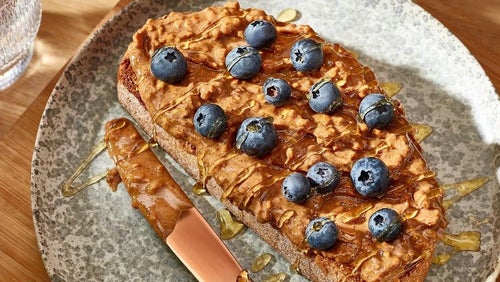
10 Best Pre-Workout Foods: What to Eat Before Exercise
What should you eat before the gym? A nutritionist reveals all ... ...
Take Home Message
Protein is a nutrient that we cannot store in the body, so it’s super important that we make sure to have our protein at regular intervals throughout the day. That arguably makes breakfast the most important meal of the day. So spend a few more minutes every morning putting together a nutritious high-protein breakfast.
FIND MORE ON NUTRITION HERE:

8 Best Plant-Based Milks
Nutritionist compares protein, carb, and fat content of the most talked about pl...

How Much Water Should I Drink A Day?
It possesses more power than you think....

- Areta, J. L., Burke, L. M., Ross, M. L., Camera, D. M., West, D. W., Broad, E. M., … & Coffey, V. G. (2013). Timing and distribution of protein ingestion during prolonged recovery from resistance exercise alters myofibrillar protein synthesis. The Journal of physiology, 591(9), 2319-2331.
- Holt, S. H., Miller, J. C., Petocz, P., & Farmakalidis, E. (1995). A satiety index of common foods. European journal of clinical nutrition, 49(9), 675–690.
- Lejeune MP, Westerterp KR, Adam TC, Luscombe-Marsh ND, Westerterp-Plantenga MS. Ghrelin and glucagon-like peptide 1 concentrations, 24-h satiety, and energy and substrate metabolism during a high-protein diet and measured in a respiration chamber. Am J Clin Nutr. 2006;83(1):89-94. doi:10.1093/ajcn/83.1.89
- Blom WA, Lluch A, Stafleu A, et al. Effect of a high-protein breakfast on the postprandial ghrelin response. Am J Clin Nutr. 2006;83(2):211-220. doi:10.1093/ajcn/83.2.211
- Rains, T. M., Leidy, H. J., Sanoshy, K. D., Lawless, A. L., & Maki, K. C. (2015). A randomized, controlled, crossover trial to assess the acute appetitive and metabolic effects of sausage and egg-based convenience breakfast meals in overweight premenopausal women. Nutrition journal, 14, 17. https://doi.org/10.1186/s12937-015-0002-7
- Anguah, K. O., Syed-Abdul, M. M., Hu, Q., Jacome-Sosa, M., Heimowitz, C., Cox, V., & Parks, E. J. (2019). Changes in Food Cravings and Eating Behavior after a Dietary Carbohydrate Restriction Intervention Trial. Nutrients, 12(1), 52. https://doi.org/10.3390/nu12010052
- Leidy HJ, Ortinau LC, Douglas SM, Hoertel HA. Beneficial effects of a higher-protein breakfast on the appetitive, hormonal, and neural signals controlling energy intake regulation in overweight/obese, “breakfast-skipping,” late-adolescent girls. Am J Clin Nutr. 2013;97(4):677-688. doi:10.3945/ajcn.112.05311
- Nutrition Claims, EU. Food Safety: https://food.ec.europa.eu/safety/labelling-and-nutrition/nutrition-and-health-claims/nutrition-claims_en
- Burke, L. M., Hawley, J. A., Wong, S. H., & Jeukendrup, A. E. (2013). Carbohydrates for training and competition. Food, Nutrition and Sports Performance III, 17-27.
- Tartibian, B., Maleki, B. H., & Abbasi, A. (2011). Omega-3 fatty acids supplementation attenuates inflammatory markers after eccentric exercise in untrained men. Clinical Journal of Sport Medicine, 21(2), 131-137.
- Corder, K. E., Newsham, K. R., McDaniel, J. L., Ezekiel, U. R., & Weiss, E. P. (2016). Effects of short-term docosahexaenoic acid supplementation on markers of inflammation after eccentric strength exercise in women. Journal of sports science & medicine, 15(1), 176.
- Poortmans, J. R., Carpentier, A., Pereira-Lancha, L. O., & Lancha Jr, A. (2012). Protein turnover, amino acid requirements and recommendations for athletes and active populations. Brazilian Journal of Medical and Biological Research, 45, 875-890.


